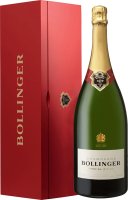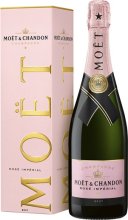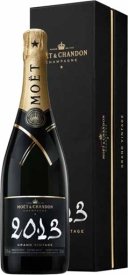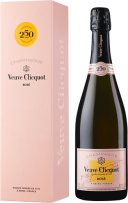Bollinger Special Cuvée
Bollinger Special Cuvée is unquestionably one of the finest of all French champagnes, the Bollinger style is distinctive for its full-bodied toasty character derived from a high proportion of Pinot Noir and the inclusion of base wine that has been matured in oak.
Mumm Cordon Rouge Vintage
G.H.MUMM Millésimé 2006 is a luminous and bright golden yellow in colour with fine, lingering bubbles.The nose reveals a superbly complex wine: notes of apple and pear, with yellow fruit such as apricot and mirabelleplum. It then develops aromas of dried fruit and nuts with hints of pastry. After a strong attack, the wine developsgradually. It then reveals the increasingly perceptible presence of Pinot Noir, giving an unctuousness to the structure before unfolding into a long, precise finish.
Moët & Chandon Nectar Impérial
Moët & Chandon Nectar Impérial is the only choice when it comes to top quality, slightly sweet Champagne. Refered to as a Demi-Sec (Semi Dry), this offering from one of the most famous Champagne Houses is a sweeter, more adventurous style. Exhibiting creme caramel flavours and lovely texture it is perfect with sticky date pudding.<p><b>Every effort is made to include a gift box with delivery, however this cannot be guaranteed.</b>
Billecart-Salmon Brut Sous Bois
This unique cuvýe is respectfully composed of the three champenois grape varieties - Chardonnay, Pinot Noir and Pinot Meunier. Entirely vinified in oak, Sous Bois (under wood) totally masters the art of blending by renewing the ancestral spirit and savoir-faire of the original Champagnes. The nose contains defined aromatics of dry fruits and fresh citrus, coupled with finely buttered seductive notes that expresses the mature complexity linked to the vinification in oak barrels. The palate is bursting with flavours of grilled brioche, vanilla and toffee, complimenting the refreshing texture and exceptional finish.
Champagne Duperrey Premier Cru Brut
Forget those mass produced Champagnes that are sourced from far away vineyards, Champagne Duperrey is sourced from 100% Premier Cru vineyards, whose quality belies its fantastic price! Champagne Duperrey is fresh and full flavoured with a crisp dry finish. It shows fine balance between the elegance of the Chardonnay, and the roundness and fruitiness of the Pinot Noir. The palate lingers, with floral, dried fruit and brioche notes. A complex and persistent Champagne full of charm.
Moët & Chandon Grand Vintage Champagne
Moët & Chandon is arguably the most famous name in the world of Champagne and "Moet" lives up to the hype. Its successful reputation is primarily built on the quality and finesse of its wines, as well as its widespread publicity. The vintage cuvée (based on Pinot Noir fruit) is rich and complex with lovely notes of brioche and almond. Moët Vintage is perfect as an aperitif or surprsingly with many wide and varied food matches.
Moet & Chandon Rose Brut Non-Vintage
Looking for a special French Champagne to celebrate with? Moet has always crafted their NV Rose as a very popular, fleshy and flavoursome style. This Champagne is fully-bodied & zestful, wild strawberries, raspberries and cherries fill the palate and finishes with a soft freshness.
Moet & Chandon Vintage Champagne
The Grand Dame of Moet & Chandon the Vintage has spent years in the cellars to emerge as a star of the Champagne line. It's best to just pop the cork and fall in love all over again this Valentines Day.
Veuve Clicquot Non-Vintage Rose
Elegant and fruity, this wine frees the senses, charms the eye and ravishes the palate. Proudly bearing the imperial red signature of Madame Clicquot. It is a delicious rosé Champagne with plenty of character. 'THIS is one of the go-to French brands for a Valentine's moment. It's all about the name, the sunset brushstroke of this rose´ and its abundant presence in the glass. There is a cherry to redcurrant-fruit focus and even a background note of sarsaparilla.' - Herald Sun, Melbourne, 12 Feb 2013
Piper Heidsieck Rose Sauvage Non-Vintage
The deep, blushed rouge of this firm, well-structured, mouth-filling vinous Rose is underpinned by a powerful bouquet of plums and blackberries, and the rich flavours of forest fruits, pomegranate and raspberries. Regis Camus, International Wine Challenge Sparkling Winemaker of the Year 2004, 2007, 2008, 2009, 2010, 2011, 2012.
















